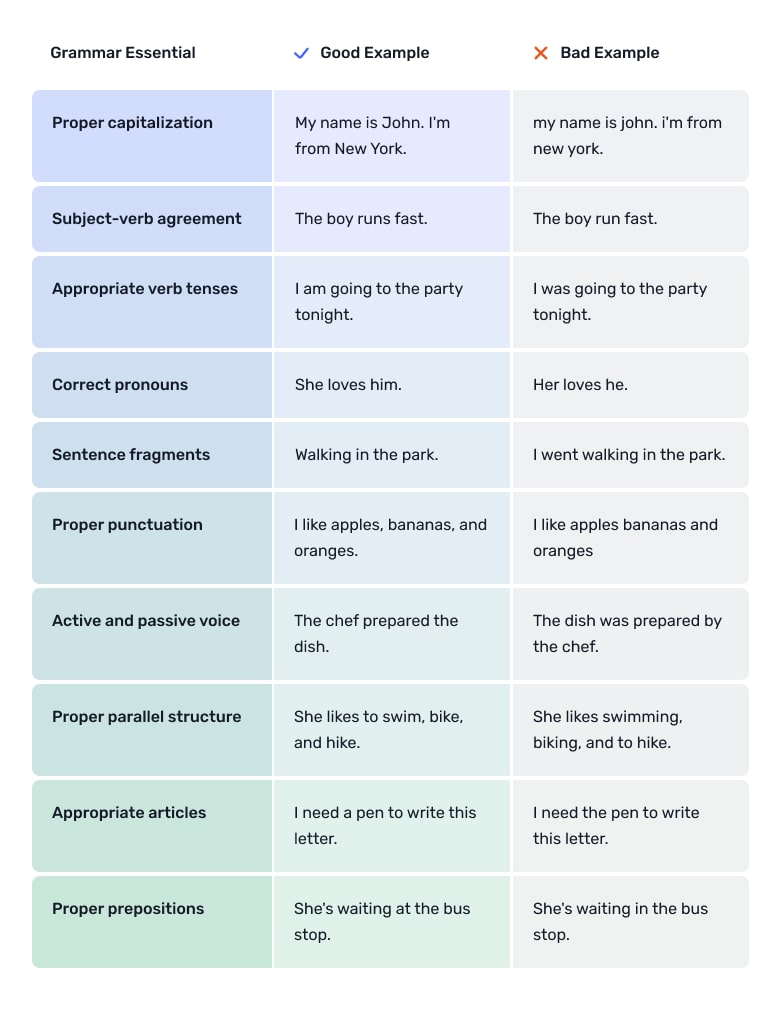Grammar Essentials
As a student, mastering grammar is essential for effective communication in both written and spoken language. Without a good grasp of grammar rules, your writing and speaking may be difficult to understand, making it challenging to convey your ideas clearly.
In this article, we’ll explore some grammar essentials that every student should know.
Use proper capitalization
One of the fundamental grammar rules is the use of proper capitalization. Capitalize the first letter of the first word of every sentence, as well as proper nouns and adjectives derived from proper nouns. Examples of proper nouns include names of people, places, institutions, organizations, and brands. Incorrect capitalization can make your writing look unprofessional and distract your readers from your message.
Pay attention to subject-verb agreement
Subject-verb agreement is the grammatical rule that ensures the subject and verb of a sentence match in number. For example, in the sentence “The cat eats fish,” the singular subject “cat” agrees with the singular verb “eats.” In the sentence “The cats eat fish,” the plural subject “cats” agrees with the plural verb “eat.” Incorrect subject-verb agreement can lead to confusion and make your writing sound awkward.
Use appropriate verb tenses
Verbs express the time at which an action occurs, and using the appropriate tense is crucial in conveying the right meaning. There are three primary verb tenses: past, present, and future. Ensure that your writing is consistent in the tense you choose and that you use the appropriate tense to match the timing of the action you’re describing.
Use correct pronouns
Pronouns are words used in place of nouns. Ensure that you use the right pronoun and that it agrees with the noun it’s replacing in terms of gender, number, and case. For example, in the sentence “She loves him,” “she” is the subject pronoun, and “him” is the object pronoun.
Avoid sentence fragments
A sentence fragment is an incomplete sentence that lacks a subject, verb, or complete thought. Sentence fragments can make your writing confusing and unclear. Ensure that each sentence you write has a subject and verb and expresses a complete thought.
Use proper punctuation
Punctuation marks are essential in conveying meaning and clarifying the structure of sentences. Proper use of punctuation marks such as commas, periods, and semicolons can make your writing clearer and easier to understand. Avoid overusing or underusing punctuation marks, and ensure that you follow the rules of punctuation to convey your intended meaning.
Know when to use active and passive voice
Active voice is when the subject of the sentence performs the action, while passive voice is when the subject receives the action. In general, it’s better to use active voice because it makes your writing more concise and direct. However, there are times when using passive voice can be appropriate, such as when the focus is on the object of the action rather than the person performing it.
Use proper parallel structure
Parallel structure is the grammatical rule that ensures that similar phrases or clauses in a sentence have the same structure. This can include using the same tense, form, or pattern of words. A proper parallel structure can make your writing sound more polished and professional.
Use appropriate articles
Articles are small words that come before nouns and indicate whether the noun is specific or general. “A” and “an” are indefinite articles that refer to a non-specific noun, while “the” is a definite article that refers to a specific noun. Ensure that you use the appropriate article to clarify the meaning of your writing.
Use proper prepositions
Prepositions are words used to indicate the relationship between a noun or pronoun and other words in a sentence. They can be tricky to use properly, so it’s essential to pay attention to their use. Make sure you use the correct preposition to show the relationship between the words in your sentence. For example, in the sentence “She’s studying for her exam,” the preposition “for” shows the relationship between “studying” and “exam.”
Examples

Mastering grammar is essential for effective communication. The grammar essentials we’ve discussed in this article can help you improve your writing and speaking skills. By paying attention to capitalization, subject-verb agreement, verb tense, pronoun usage, sentence structure, punctuation, active and passive voice, parallel structure, articles, and prepositions, you can create clear and concise sentences that convey your message accurately. With practice and attention to these grammar essentials, you’ll be well on your way to becoming a more confident and effective academic author.